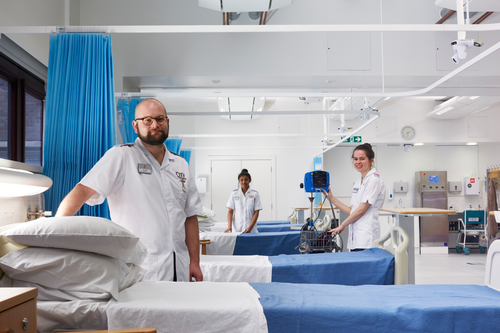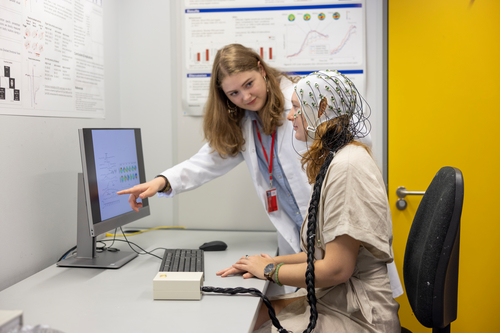The School of Health & Psychological Sciences at City, University of London is a leader in healthcare education and research. In fact, it is ranked #1 for Health Professions (The Guardian League Table 2023) and is part of a university that’s ranked 18th in the UK and second in London for the overall quality of research within the Allied Health Professions, Dentistry, Nursing and Pharmacy Unit of Assessment (Research Excellence Framework 2021). Its research in this field is rated 4* (outstanding) and 3* (very considerable) for impact. The REF assesses the research taking place across UK universities.
Both research and industry inform all the school’s postgraduate degrees. Even the professors leading these programmes are heavily involved in interdisciplinary research in nursing, midwifery, food policy, health policy, psychology, cognitive neuroscience, autism, child development, memory and more. Their important work goes a long way towards transforming healthcare services in the UK and all over the world. As a student, you will be able to learn directly from such experienced educators and be part of cutting-edge research in the field.
The School of Health & Psychological Sciences offers accredited clinical master’s and bespoke master’s programmes for those with or without clinical backgrounds. These options are available in two key departments. In the Department of Health Services Research and Management (HSRM), the programmes are curated to help you contribute to better health systems through management, policy, practice, and leadership.
One of the highlight degrees in this department is the MSc Food Policy. The only one of its kind in the world, it’s based in the interdisciplinary Centre for Food Policy with access to food policy research and academics. You will get to examine the interconnected webs within our food system and the importance of food policy within wider health, economic and environmental goals. Choose from several start dates or pursue this MSc in person or online — the flexibility is yours to decide.
Chicago-born graduate Margot Tuchler left her hometown for this degree because she thought this was an incredible opportunity to live and learn in the beating heart of the UK, London. “I’m a firm believer that education is just as much about what you do in the classroom as it is about what you do in your free time,” she says. “London is such a thriving setting in the world of food policy and beyond. I knew that moving here would not only allow me to accomplish my academic goals in a new city, but it would also grant me access to the rest of the world via this city’s amazing diversity and never-sleeps atmosphere.”

City, University of London is synonymous with academic excellence, ranking first in London for Health Professions (The Guardian League Table 2023). Source: City, University of London
With these same flexible parameters, the Master of Public Health (MPH) is a postgraduate-taught degree that sets you on the path to a successful international career in management or leadership. You will gain a deeper understanding of public health theory and methods of research and analysis. Students like Najima Bawa are at first drawn to the benefits of the school’s location but also know that this MPH will give them a competitive edge in their future careers. “I applied to this course because diversity is very important to me. Not only did I want the opportunity to learn from professors who come from and have worked all around the world,” she says. “It was also important for me to maximise my learning with people who could bring their life experiences from around the world into the classroom.”
It is clear that diversity is a huge part of the City experience. This translates into a specialised range of master’s programmes that address pressing issues faced by many. Take the MSc Applied Nutrition, created to meet the growing demand for well-trained nutritionists. You do not need a background in nutrition as opportunities such as learning from leading academics in the field (such as Dr. Honglin Dong) will inform and enhance your learning. This MSc’s curriculum is aligned with Association for Nutrition (AfN) competencies and features elements in medical, nutritional, social and psychological sciences as well as exercise nutrition and the humanities.

The MSc Psychology (Conversion) is a fast-track programme for those who want to switch to the dynamic fields of exploring the wonders of the human mind. Source: City, University of London
Over at the Department of Psychology, you could join the MSc Psychology of Health and Well-being MSc, which will show you how to help your clients change their behaviour and adjust to long-term conditions. Whether you hope to pursue work in health or social care sectors or take on health well-being research, this MSc will give you the essential tools. A key advantage of this programme is its work-based module that enhances your skills and focuses on career development.
The Psychology (Conversion) MSc is a fast-track programme for those who want to switch lanes from their undergraduate in a different discipline. It will prepare you for a career or further research in psychology.
However, if you want to enhance your prospects in a PhD in economics or psychology, choose the MSc Behavioural Economics MSc. In this degree, you will explore human behaviour and investigate how people make economic decisions under various conditions of constraint (e.g. time and knowledge) and influence (e.g. social pressure). This quickly growing field is now considered a crucial area in modern economics, with its potential for influencing or “nudging” people into different decisions across the economic domain now recognised by UK and US governments.
Follow City, University of London on Facebook, X, LinkedIn, Instagram and YouTube.












